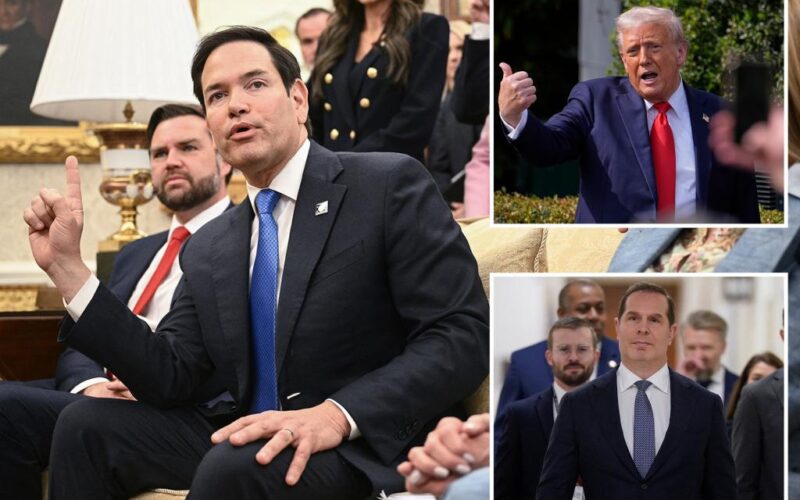WASHINGTON — The Trump administration could close or “drastically” downsize its footprint at dozens of US embassies and consulates — including at what some former US officials have said are critical installations in Somalia and Iraq — while reducing spending on agency operations by up to $26 billion, according to memos obtained by The Post.
One State Department document shows at least 17 consulates — in the UK, France, Germany, Greece, Italy, South Korea, and Bosnia and Herzegovina — and 10 embassies — including outposts in Malta, the Maldives, Grenada, Luxembourg and several African nations — have been suggested for the chopping block.
Three significant posts in Iraq were also designated as part of cost-reduction efforts — with the Baghdad Diplomatic Support Center, a massive compound in the Iraqi capital, slated for potential closure and missions in Baghdad and Erbil listed as places to “drastically reduce expenditures.”
“Reductions to the footprint in Iraq are a long time coming but ‘drastic’ measures at Erbil could truly jeopardize the lives of countless Christians and Yazidis,” one former US Agency for International Development (USAID) official told The Post, noting “the good work” done there in President Trump’s first administration.
Other locations in Japan and Canada may also be restructured to reduce their footprints, along with so-called “embassies in exile” for Yemen, located in Saudi Arabia; and Venezuela, located in Colombia.
Much of the downsizing will lead to diplomats being rehoused in nearby stations.
Another State Department memo outlined up to $26 billion in spending cuts for the upcoming fiscal year, with $4.5 billion lopped off from diplomatic engagement work and $21.5 billion terminated for foreign assistance based on fiscal year 2025 spending levels.
The April 10 memo, drafted by recently departed USAID deputy administrator Peter Marocco and State Department Bureau of Budget and Planning Director Douglas Pitkin, suggested $28.4 billion for agency operations as recommended by the Office of Management and Budget — with $20.4 billion in rescissions.
OMB had already put forward a plan to claw back $8.3 billion “in wasteful foreign aid spending” from the 2025 budget, according to a memo exclusively obtained by The Post on Monday, which was forwarded to key congressional Republicans.
The State Department budget memo further floated eliminating funding for the United Nations and NATO, roughly 50% in overall cuts to humanitarian assistance and global health programs that have included HIV treatments, as well as clawing back unobligated funds approved by Congress and signed into law by former President Joe Biden as part of the bipartisan CHIPS Act.
It also highlighted a novel “America First Opportunities Fund” to be set up in fiscal year 2026 with $2.1 billion in spending — advocating for strategic priorities in countries such as Jordan and India or further work on countering China.
State Department spokeswoman Tammy Bruce said in a Tuesday briefing that there was “no final plan” on the 2026 budget and spending cuts were ultimately “up to the White House.”
“I can tell you that whatever you’ve seen in public was not released from this entity, was not released from this department. It was not released by the secretary,” Bruce added.
Secretary of State Marco Rubio earlier Tuesday had trumpeted “another 138 grants worth $214 million” that he “canceled,” as the Elon Musk-inspired Department of Government Efficiency combs through agency spending programs to trim the federal budget.
“The American taxpayers should not be funding misguided programs like ‘Building the Migrant Domestic Worker-Led Movement’ in Lebanon or ‘Get the Trolls Out!’ in the United Kingdom,” Rubio posted on X.
“We are cleaning up the mess the previous administration left and rebuilding an agency that’s focused on putting America First.”
Former US officials have indicated that the embassies and consulates singled out already had fairly limited personnel to help Americans with visa services and send diplomatic cables back to Washington, DC, with one calling the closure of the embassies and consulates “unprecedented at this level.”
“Closures sometimes need to happen,” the ex-USAID official said, though they added that is usually done in close coordination with Congress.
“These decisions are concerning and signal a further retreat from the world stage.”
Republican foreign policy leaders in Congress have yet to weigh in on the proposal, but some Democrats have come out against it — including Senate Foreign Relations ranking member Jeanne Shaheen (D-NH) who told the New York Times the cuts “would leave our country alone and exposed and allow China and Russia to fill the vacuum made vacant by this administration.”
State Department reps did not immediately respond to requests for comment.








